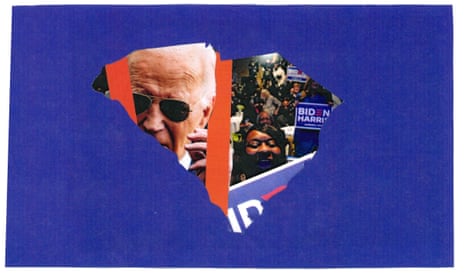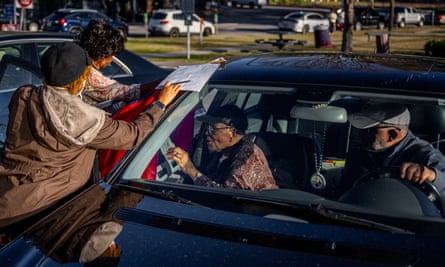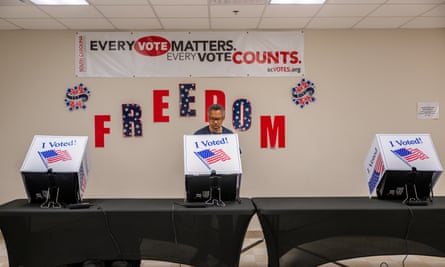Biden is betting on South Carolina’s Black voters. But does he still have their support?
"South Carolina propelled him to the White House last time around, and the president is eager for voters to back him again

Jonathan Fields and Taj McClary, two college freshmen, were chatting on Monday after class at a South Carolina State University snack shop. Both are young Black men from rough neighborhoods in North Charleston. They’ve made it out. But only so far.
Fields is a mechanical engineering major with a 3.2 GPA, which isn’t enough to keep his state scholarship, he said. He’s looking at getting a job, but not just so he can afford a basket of chicken tenders after class.
“I have an interview tomorrow at Wendy’s, just so I can send money back home and still get stuff,” Fields said. He’s not sure who he’s voting for in the Democratic primary on Saturday.
“You don’t just succeed. You actually work for everything. Nothing is never handed to you. So when you come down here and you look at politics, you actually have to watch it.”
On Saturday, South Carolina voters will head to the polls in a Democratic primary contest that is as much a coronation of Joe Biden as the Republican race here two weeks later appears to be of Donald Trump. But the common anxieties of Black voters lie beneath the placid surface of Biden’s re-election campaign, even after he chose to eschew tradition and launch his primary season in the state.
There’s a contrast between Biden’s rhetoric and the lived reality of many Black voters in South Carolina who propelled him to the White House four years ago. That leaves some pointing to signs of improvement, but many people keenly aware of how far away equality remains, and how easily these gains can be reversed.
Four years ago, Biden recovered from stumbles in Iowa and New Hampshire to win a resounding victory in this state – his first primary victory in his third run for the White House.
Two Black senators – Kamala Harris of California and Cory Booker of New Jersey – were on the ballot in 2020, hoping to capture the magic of Barack Obama’s victorious run of 2008. It didn’t matter. An early endorsement by James Clyburn, dean of the Black congressional caucus and the state’s only Democratic congressman, galvanized the Black vote for Biden, who went on to win nearly half of South Carolina’s Democratic voters and a first-place finish in every county in the state.
Biden has been plain in acknowledging his political debt to South Carolina, and specifically to South Carolina’s Black electorate. According to 2020 exit polling, about 60% of Democratic voters in South Carolina are Black and about 90% of Black voters here cast ballots for Democrats.
“I wouldn’t be here without the Democratic voters of South Carolina, and that’s a fact,” Biden said on Saturday at a celebratory dinner in Columbia. “You’re the reason I am president.”
Democrats are celebrating South Carolina’s new status as the first Democratic primary in the nation, both a political gift by Biden and an acknowledgment by the Democratic party that something had to change, said Marlon Kimpson, a former state senator.
“There was a large push by the party leadership to hold the first-in-the-nation primary in South Carolina, because the South Carolina Democratic party electorate mirrors the rest of the country,” he said. “The challenge with that is that the president doesn’t have any meaningful opposition. It’s a double-edged sword. While we are very excited about hosting the first primary, we’ve had to start early and work extremely hard to generate enthusiasm.”

Indeed, neither Congressman Dean Phillips nor author Marianne Williamson have generated much enthusiasm for their primary challenge of a sitting president. A poll conducted by Emerson College on 5 January indicated that 69% of Democratic primary voters in South Carolina intend to vote for the incumbent. About 5% support Phillips and 3% support Williamson in the poll. Twenty-two per cent were undecided.
“As I drive down Highway 17, there are no campaign signs,” Kimpson said. “In 2020, not only were there campaign signs, this close to the election there were people holding handheld signs. Radio ads. Bumper stickers. Social media posts 24/7.”
This is also the first presidential primary contest in South Carolina which has had early voting. So far, fewer than 30,000 voters have cast Democratic primary ballots.
“Turnout is going to be low. We know that,” said Cliff Albright, a co-founder of the Black Voters Matter activist organization based in Atlanta. Albright led a series of town halls and voter education events in South Carolina last week. “If your benchmark is what happened in a previous primary, you’re going to be confused. Certainly, you can’t compare it to four years ago. The primary turnout is not going to tell us a whole lot.”
Albright said he sees tension between the local concerns of Black voters and a state government dominated by white Republicans. For example, a recent cross burning in Conway, a gentrifying suburb of Myrtle Beach, has heightened interest in passing a hate crimes law at the state level. Activists have been pressing with increasing vigor for this political goal since the 2015 murders of nine people, including a state senator, at a historic Black church in Charleston.
“Without a hate crimes law, who’s the president and who’s the attorney general and who’s running the Department of Justice matters,” Albright said.
As the president formally begins his re-election campaign push, his message to Black voters has been to look at the promises he has made and kept to communities of color. Biden has elevated Black women to positions of authority, choosing Harris as his vice-president, appointing Ketanji Brown Jackson to the US supreme court and a record number of Black women to the federal bench.
Capping insulin costs for consumers has been one of those signature accomplishments, Kimpson said. According to the American Diabetes Association, about 11.6% of Americans are diabetic, with a disproportionate disease burden affecting Black people. One out of eight South Carolinians is diabetic, according to data from the Medical University of South Carolina. For Black South Carolinians, it’s one in six. For those over 65, it’s one in four.
Betty Owens of Orangeburg is 67. She receives insulin free of charge through Medicare, she said. On a Wednesday afternoon, she picked through the crust of some fried gas-station chicken breasts. “I don’t eat the outside,” she said. “It’s not that bad if you control it.”
Owens, who had to pay for insulin out of pocket before the law changed, said the new policy was an important reason she’s voting for Biden in the primary and in November. She believes her health depends on it.
Owens’ son and daughter got jobs paying more than they had been earning in the Trump years, one at an automotive company, another at a bakery. Biden “put out a lot of jobs out there, and more money with the jobs. When I was working, we weren’t making $19 or $20 an hour,” she said.
The problem, she said, was inflation. While the rate of inflation in the United States has been lower than in other industrialized countries, and falling now, prices are still much higher than before the pandemic. “You run through that money like it isn’t even there,” she said. “You go into a store and you buy a few items, and it’s too much money.”
The Black unemployment rate in April briefly dipped below 5% for the first time in history and remains lower over the last year than any previous period in American history. With remarkable historical consistency, the Black unemployment has usually moved in lockstep at double the white unemployment rate. Labor data over the past year suggests this is starting to uncouple: Black and white unemployment rates are inching closer together, perhaps a sign that endemic discrimination is receding.
In absolute terms, economic outcomes for Black voters are improving. In relative terms, however, they’re falling behind. The wealth gap between Black and white households has increased in Biden’s term. Black households remain about 30% less likely to own a home than white households, driving this gap. The average Black worker earns 76¢ to a dollar earned by the average white worker.
In South Carolina, it’s 73¢ to the dollar.

Solving these problems requires a programmatic response, Kimpson said. “People are looking for immediate results in their mailbox, in their zip code. When you look at the American Rescue Plan, people actually got checks.”
Student loan relief – $130bn and counting – has also been a signature chicken-in-the-pot item in Biden’s re-election campaign. Black students have borne a larger burden from those loans. While student loan relief unburdens people who have previously taken out loans, it’s not doing much for people in school today such as Fields, the freshman engineering student.
“In order for me to get into the profession that I want to get into, I have to go to college,” Fields said. “But it’s like: I have to struggle just to get to where I want to be. Because nobody wants to help you. They tell everybody without college you won’t be anything, but how can I get there? There’s no help.”
The return of Donald Trump to the White House remains a potent, motivating threat for Democrats, regardless of anemic turnout in a primary campaign, and Biden appears to know that.
“I want you to imagine the future nightmare if Trump is back in office,” Biden told South Carolina Democrats last week. “Given the nightmare when he was in office, you know what is likely to come.” His stump speech conjures threats of a national abortion ban, the repeal of the Affordable Care Act, cuts to social security and an amplification of divisive politics.
Biden’s rhetoric looks beyond the primary, fixated on his expected opponent in November and on repudiating Trump’s election claims. On Saturday, South Carolina voters will signal just how well that message is working.
“The second Lost Cause is Trump’s big lie that the 2020 election was stolen,” Biden said. We cannot allow that lie to live either, because it threatens our very democracy. Folks, there are truth, and there are lies – lies told for power, lies told for profit. We must call out these lies with a voice that is clear and unyielding.”
No comments:
Post a Comment